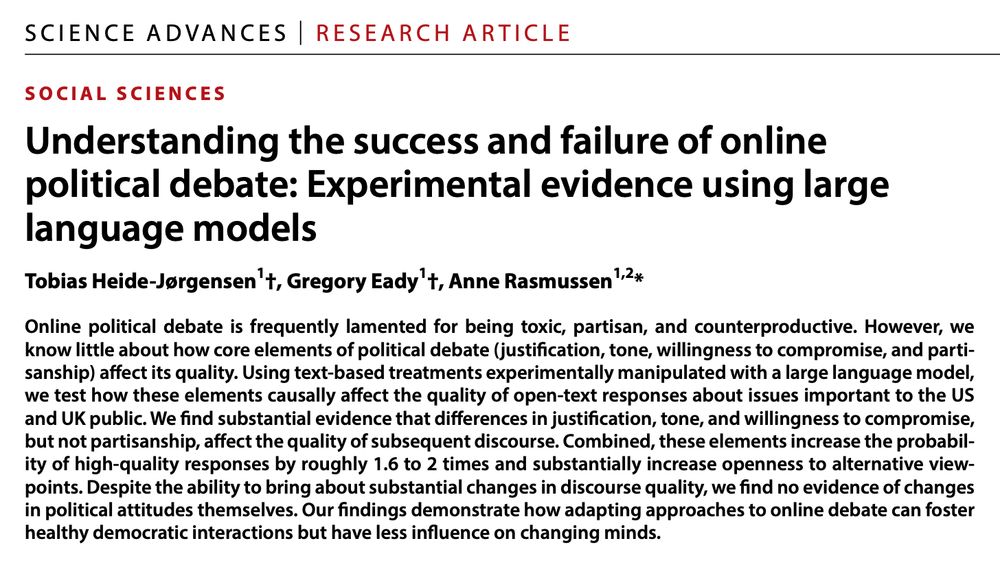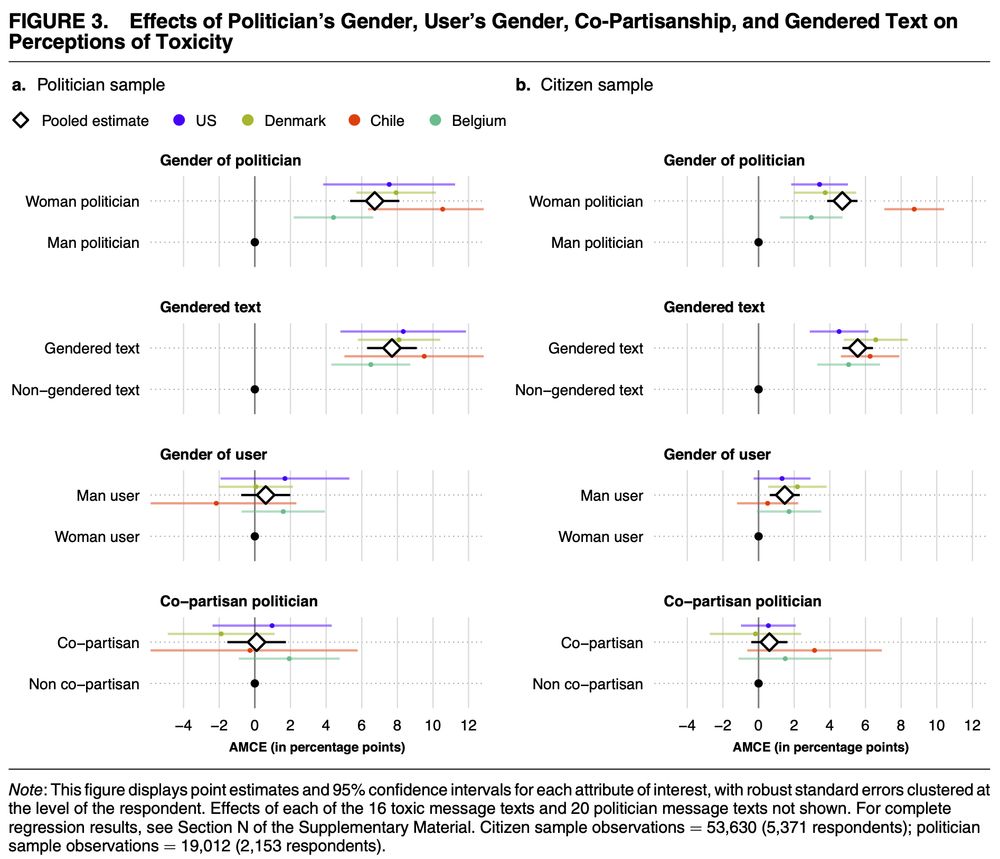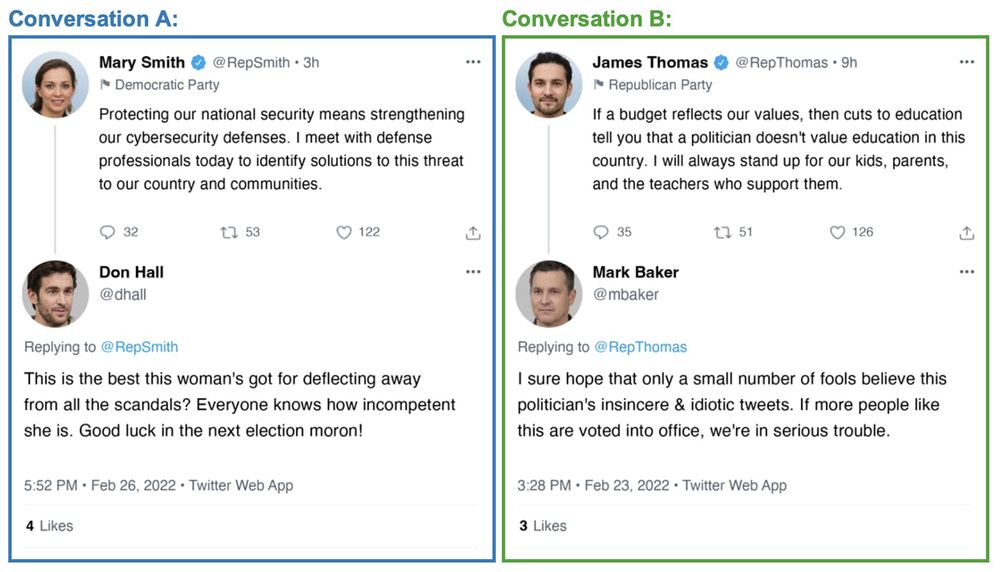
University of Copenhagen. Lobbying | Political Representation | Public Opinion & Policy | Gender | Social Media | EIC @igajournal.bsky.social | PI ADVODID ERC Grant |ECPR ExecComm
https://annerasmussen.eu
If interest groups matter, their influence is mostly indirect—by shaping politicians’ own views, which in turn are associated with their (biased) perceptions of citizens.
7/10


If interest groups matter, their influence is mostly indirect—by shaping politicians’ own views, which in turn are associated with their (biased) perceptions of citizens.
7/10
On average, politicians misestimate support by 22 percentage points (!).
BUT biases vary a lot (!) by issue & country.
2/10

On average, politicians misestimate support by 22 percentage points (!).
BUT biases vary a lot (!) by issue & country.
2/10
Why do politicians often misperceive what citizens' policy positions are?
@simonotjes.bsky.social and I study ~10,000 estimates of public opinion by politicians in Denmark & the Netherlands to uncover the sources of these (mis)perceptions
Thread 🧵1/10

Why do politicians often misperceive what citizens' policy positions are?
@simonotjes.bsky.social and I study ~10,000 estimates of public opinion by politicians in Denmark & the Netherlands to uncover the sources of these (mis)perceptions
Thread 🧵1/10
10/n

10/n
(1) Respect begets respect
(2) Evidence elicits evidence
(3) Openness invites openness
(4) Disrespect provokes partisan attacks
When arguing about politics, you get what you give.
9/n

(1) Respect begets respect
(2) Evidence elicits evidence
(3) Openness invites openness
(4) Disrespect provokes partisan attacks
When arguing about politics, you get what you give.
9/n
Evidence-based, respectful, compromise-seeking, and non-partisan counter-arguments substantially increase the probability of High Quality replies...
(HQ = justification/compromise+respectful+no partisan attacks)
6/n

Evidence-based, respectful, compromise-seeking, and non-partisan counter-arguments substantially increase the probability of High Quality replies...
(HQ = justification/compromise+respectful+no partisan attacks)
6/n
An LLM then generates a counter-argument, randomizing the four features, 2×2×3×2 = 24 possibilities:
evidence/emotion x open/closed to compromise x in-/out-/non-partisan x respectful/disrespectful
3/n

An LLM then generates a counter-argument, randomizing the four features, 2×2×3×2 = 24 possibilities:
evidence/emotion x open/closed to compromise x in-/out-/non-partisan x respectful/disrespectful
3/n
Can changing how we argue about politics online improve the quality of replies we get?
T HeideJorgensen, @gregoryeady.bsky.social & I use an LLM to manipulate counter-arguments to see how people respond to different approaches to arguments
Thread 🧵1/n

Can changing how we argue about politics online improve the quality of replies we get?
T HeideJorgensen, @gregoryeady.bsky.social & I use an LLM to manipulate counter-arguments to see how people respond to different approaches to arguments
Thread 🧵1/n
The perceived motives behind toxic behavior toward women and men differ:
- Toxic behavior toward women politicians is connected with prejudice and desires to push them out of politics
- And LESS likely to seen as motivated by opinion differences
[10/14]

The perceived motives behind toxic behavior toward women and men differ:
- Toxic behavior toward women politicians is connected with prejudice and desires to push them out of politics
- And LESS likely to seen as motivated by opinion differences
[10/14]
These judgments hold across all relevant sub-groups of politician and citizen respondents
[9/14]

These judgments hold across all relevant sub-groups of politician and citizen respondents
[9/14]
Stronger effects when toxic behavior is gendered or the perpetrator is a man
[8/14]

Stronger effects when toxic behavior is gendered or the perpetrator is a man
[8/14]
Strong evidence that perceptions of toxic behavior depend on context. Equivalent messages to women are judged as more toxic
[7/14]

Strong evidence that perceptions of toxic behavior depend on context. Equivalent messages to women are judged as more toxic
[7/14]
Visual conjoint survey experiments that mimic toxic conversations on social media in the US, Belgium, Chile, and Denmark
Respondents: Politicians (~350-1000 per country) & citizens (~1,200 per country)
[5/14]

Visual conjoint survey experiments that mimic toxic conversations on social media in the US, Belgium, Chile, and Denmark
Respondents: Politicians (~350-1000 per country) & citizens (~1,200 per country)
[5/14]
More in this [1/14]

More in this [1/14]
The perceived motives behind toxic behavior toward women and men differ:
- Toxic behavior toward women politicians is connected with prejudice and desires to push them out of politics
- And LESS likely to seen as motivated by opinion differences
[9/14]

The perceived motives behind toxic behavior toward women and men differ:
- Toxic behavior toward women politicians is connected with prejudice and desires to push them out of politics
- And LESS likely to seen as motivated by opinion differences
[9/14]
These judgments hold across all relevant sub-groups of politician and citizen respondents
[8/14]

These judgments hold across all relevant sub-groups of politician and citizen respondents
[8/14]
Stronger effects when toxic behavior is gendered or the perpetrator is a man
[7/14]

Stronger effects when toxic behavior is gendered or the perpetrator is a man
[7/14]
Strong evidence that perceptions of toxic behavior depend on context. Equivalent messages to women are judged as more toxic
[6/14]

Strong evidence that perceptions of toxic behavior depend on context. Equivalent messages to women are judged as more toxic
[6/14]
Visual conjoint survey experiments that mimic toxic conversations on social media in the US, Belgium, Chile, and Denmark
Respondents: Politicians (~350-1000 per country) & citizens (~1,200 per country)
[4/14]

Visual conjoint survey experiments that mimic toxic conversations on social media in the US, Belgium, Chile, and Denmark
Respondents: Politicians (~350-1000 per country) & citizens (~1,200 per country)
[4/14]
"Gendered Perceptions of Toxicity Online"
forthcoming @apsrjournal.bsky.social, has contributed to two news stories that made it to the front page of Danish @politiken.dk
politiken.dk/danmark/art1...
politiken.dk/danmark/art1...


"Gendered Perceptions of Toxicity Online"
forthcoming @apsrjournal.bsky.social, has contributed to two news stories that made it to the front page of Danish @politiken.dk
politiken.dk/danmark/art1...
politiken.dk/danmark/art1...
Thanks to Raluca Pahontu for co-organizing many of the speakers
Feel free to reach out to @ninaobermeier.com or me if you'd like to attend

Thanks to Raluca Pahontu for co-organizing many of the speakers
Feel free to reach out to @ninaobermeier.com or me if you'd like to attend

Only an emotional tie (trust) leads to a stronger preference for the representation of business groups [8/11]


Only an emotional tie (trust) leads to a stronger preference for the representation of business groups [8/11]
Citizens with any type of ties to cause groups consider processes that under-represent these groups as less legitimate than processes that under-represent business groups [7/11]

Citizens with any type of ties to cause groups consider processes that under-represent these groups as less legitimate than processes that under-represent business groups [7/11]




